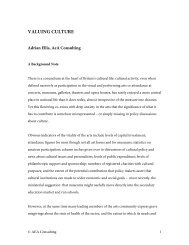Cultural diplomacy - Demos
Cultural diplomacy - Demos
Cultural diplomacy - Demos
Create successful ePaper yourself
Turn your PDF publications into a flip-book with our unique Google optimized e-Paper software.
<strong>Cultural</strong> Diplomacy<br />
of this was the Convention on Biological Diversity (CBD), which was<br />
signed and ratified by the majority of the world’s countries and<br />
within which institutions like the Natural History Museum and the<br />
Royal Botanic Gardens, Kew, play an important role in implementation<br />
and building best practice within the UK and worldwide.<br />
There are also numerous organisations devoted to self-governance<br />
and cooperation, from the International Council of Museums<br />
(ICOM) to the International Federation of Library Associations<br />
(IFLA); from the International Music Association (IMA) to the<br />
Eurocities Culture Forum. These organisations variously encompass<br />
academic, commercial, professional and geographic interests, and<br />
form an important international confederacy. Many of their<br />
individual and/or organisational members are part of several groups,<br />
thus forming an overlapping set of relationships that promote flows<br />
of information, expertise and cooperation, and providing an obvious<br />
point of interface between the government and the cultural sector.<br />
Our cultural institutions are good ambassadors for<br />
the UK<br />
The UK’s national cultural institutions work in the public interest.<br />
While there is, of course, healthy competition among them and<br />
between them and their peers overseas, their working model is<br />
underpinned by an understanding that their purpose is to serve the<br />
public interest. This is in turn how they earn their licence to operate,<br />
which then reinforces their public mandate. The public service nature<br />
of these institutions makes them effective, but unofficial, ambassadors<br />
for the UK while their public appeal makes them a valuable<br />
bridge between <strong>diplomacy</strong>, international relations and public<br />
opinion.<br />
Through their collections and activities our national cultural<br />
institutions have an international responsibility and remit. As the<br />
National Museum Directors’ Conference puts it: ‘As institutions<br />
preserving, interpreting and presenting major cultural and national<br />
assets from around the world, we are by definition international in<br />
scope.’ 42 For example, the NHM has many international collaborative<br />
40 <strong>Demos</strong>






